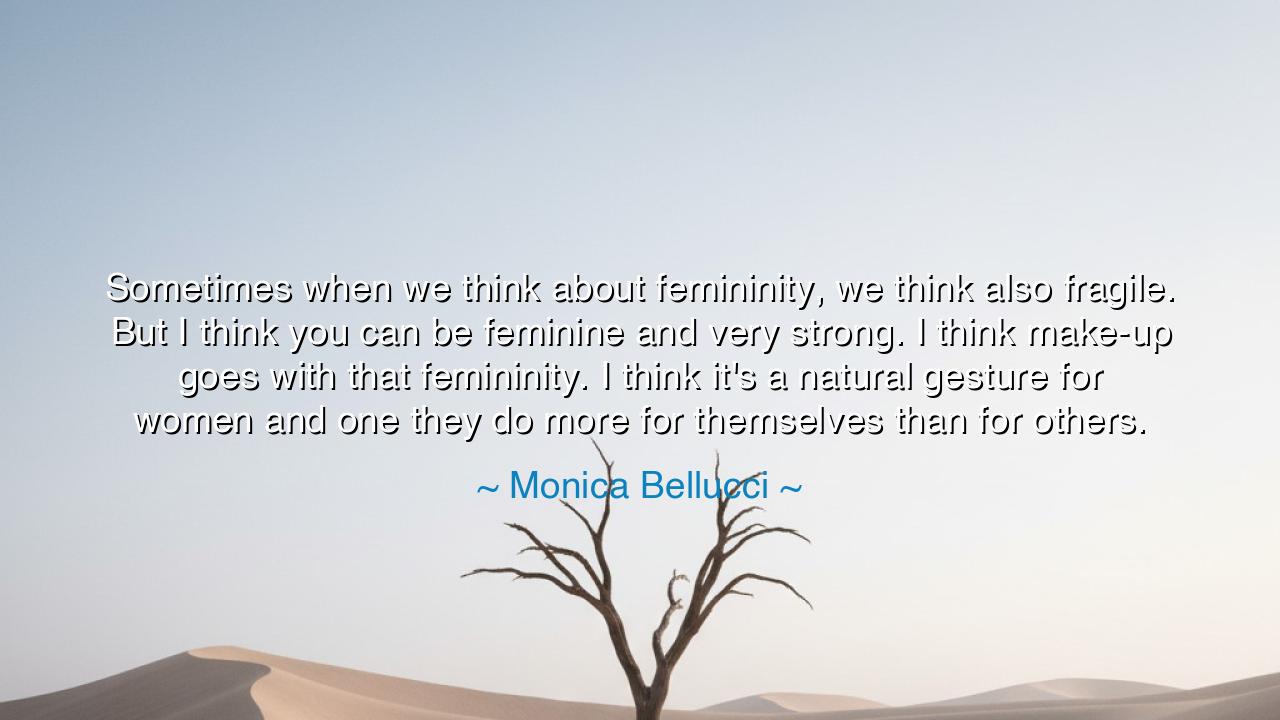
Sometimes when we think about femininity, we think also fragile.
Sometimes when we think about femininity, we think also fragile. But I think you can be feminine and very strong. I think make-up goes with that femininity. I think it's a natural gesture for women and one they do more for themselves than for others.






The words of Monica Bellucci, spoken with grace and conviction, shine as both a defense and a celebration: “Sometimes when we think about femininity, we think also fragile. But I think you can be feminine and very strong. I think make-up goes with that femininity. I think it’s a natural gesture for women and one they do more for themselves than for others.” In these lines, she unravels the false belief that femininity is weakness, and replaces it with a vision of beauty joined with strength, delicacy intertwined with resilience.
The ancients themselves often erred in this. They sang of women as fragile flowers, in need of protection, yet in the same breath told tales of Amazons, of queens, of goddesses like Athena and Isis who embodied both wisdom and power. Bellucci speaks in that ancient spirit: that womanhood is not a contradiction of strength, but its hidden source. To adorn oneself with make-up, to embrace beauty, is not to serve others, but to honor the self—a ritual as natural as the warrior polishing his armor before battle.
Consider the life of Cleopatra, the last queen of Egypt. Historians wrote of her beauty, her perfumes, her painted eyes—but beneath these outward gestures was a mind sharper than steel. She ruled kingdoms, swayed emperors, and defied the mighty Rome itself. Was she fragile? No—she was both feminine and powerful, her adornments no weakness but part of the radiance of her authority. Like Bellucci, she proved that to cultivate beauty is not to abandon strength, but to wield it differently.
Bellucci’s words also challenge the gaze of society, which too often reduces women’s gestures of beauty to performance for others. She declares instead that make-up and adornment are acts of self-expression, chosen by women for themselves. In this way, femininity becomes not a mask but a mirror, reflecting inner strength and dignity, rather than surrendering to outside judgment.
Let the generations remember: femininity is not fragility but power clothed in grace. A woman may be soft in gesture yet unbreakable in spirit, adorned in beauty yet commanding in presence. Bellucci’s wisdom calls us to see beyond the shallow division of strength and softness, teaching that they dwell together in harmony. For the truly strong need not cast away their femininity, but embrace it as both shield and crown, an eternal gesture of selfhood and strength.






NLVi Ngoc Linh
Bellucci’s words make me reflect on how we view femininity. It’s fascinating that she associates makeup with both strength and femininity. But I wonder if, in some cultures, makeup might still be seen more as a societal obligation than a personal expression of strength. Does every woman feel empowered by makeup, or do some feel pressured into wearing it to fit into the narrow definitions of femininity?
Ttduong
Monica Bellucci’s thoughts on femininity and makeup are refreshing in that they challenge traditional ideas. It’s true that women should be allowed to define their strength and femininity on their own terms. But could it be that makeup is sometimes seen as a societal expectation rather than a personal choice? In today’s world, can femininity exist without the pressure of appearance standards, or is there always an element of expectation tied to it?
MLMary Liliam
I love how Bellucci reframes femininity. Often, there’s this narrative that women have to choose between being feminine and being strong, but she shows that they can coexist. Makeup, as she points out, can be a personal choice, not just a way to meet others’ expectations. But does society still judge women based on their appearance? If makeup helps women feel more empowered, why should anyone question it as a form of self-expression?
PTtu ngoc phuong trinh
Bellucci makes an interesting point about femininity and strength, suggesting that makeup is an empowering choice for women. But is there a risk in tying femininity to something external like makeup? What happens when a woman chooses not to wear makeup? Does that mean she’s not feminine or strong? I believe femininity can be expressed in many ways, not just through appearance, and that strength comes from self-confidence, regardless of how one presents themselves.
TPToan Pham
Monica Bellucci’s perspective challenges the often-held belief that femininity is synonymous with fragility. It’s empowering to think that women can express strength through their femininity, not in spite of it. But what does this say about societal expectations? Does the act of wearing makeup really empower women, or does it reinforce the idea that appearance is central to femininity? I think there’s a fine balance between embracing beauty rituals and feeling pressured by them.